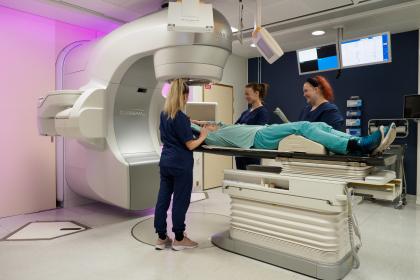Paediatric brain tumours
Keywords:Brain tumours are the second most common form of cancer among children, but they are still rather rare. Our hospital treats less than 10 paediatric patients with a brain tumour yearly.
Typical symptoms
The symptoms vary depending on the size, location and growth speed of the brain tumour. Benign brain tumours may not give any symptoms for years. Typical symptoms caused by tumours of the cerebellum and midline are headache and vomiting in the morning. These symptoms arise from the cerebrospinal fluid not being able to circulate normally because the tumour obstructs the flow.
When the circulation of the fluid is compromised, the ventricles of the brain expand and the intracranial pressure increases; this is the cause for the symptoms in the morning. Local symptoms are possible and depend on the location of the tumour.
In addition to headache and vomiting, the patient may experience fatigue, poor balance, changed vision, aberrations in the normal regulation of growth or other hormonal functions, paralytic symptoms or epileptic convulsions.
Treatment
About half of the paediatric brain tumours are of low degree, which means that sufficient treatment of these tumours consists of surgery followed by close follow-up and rehabilitation, if needed. After the operation, the patients are cared for at the intensive ward for adults, then the intensive care ward for children, after which they are moved to the regular paediatric ward.
The duration of hospital treatment after the operation varies from case to case and may extend from a little more than a week to one month.
Some of the brain tumour patients need also other treatments in addition to surgery, e.g., chemotherapy and radiation treatment. These forms of treatment are not simple and they may be given for an extended time, up to an entire year. They are often associated with adverse reactions and hence some patients will need hospital treatment because of infections and insufficient nutrition.
The diagnosis and treatment follow-up of paediatric brain tumours relies on MRI. The treatment team consists of paediatric oncologists and neurosurgeons complemented, e.g., with radiation therapy physicians, paediatric neurologists and endocrinologists.
Tyks provides also therapy of the most demanding brain tumours. For example, children under age 3 years with a malignant brain tumour are treated intensively, and this includes returning stem cells collected from the patient to the patient later.
Prognosis
The prognosis of a child with a brain tumour depends on the type of tumour and on whether it is fully removable by surgery or not.
Drug and surgical therapies have developed enormously. On average 70% of the children with a brain tumour can be cured permanently, but long-term effects of the tumour and the treatment are experienced by most patients.
Treatment facilities
Department of Radiotherapy
We perform radiotherapy primarily on cancer patients.
